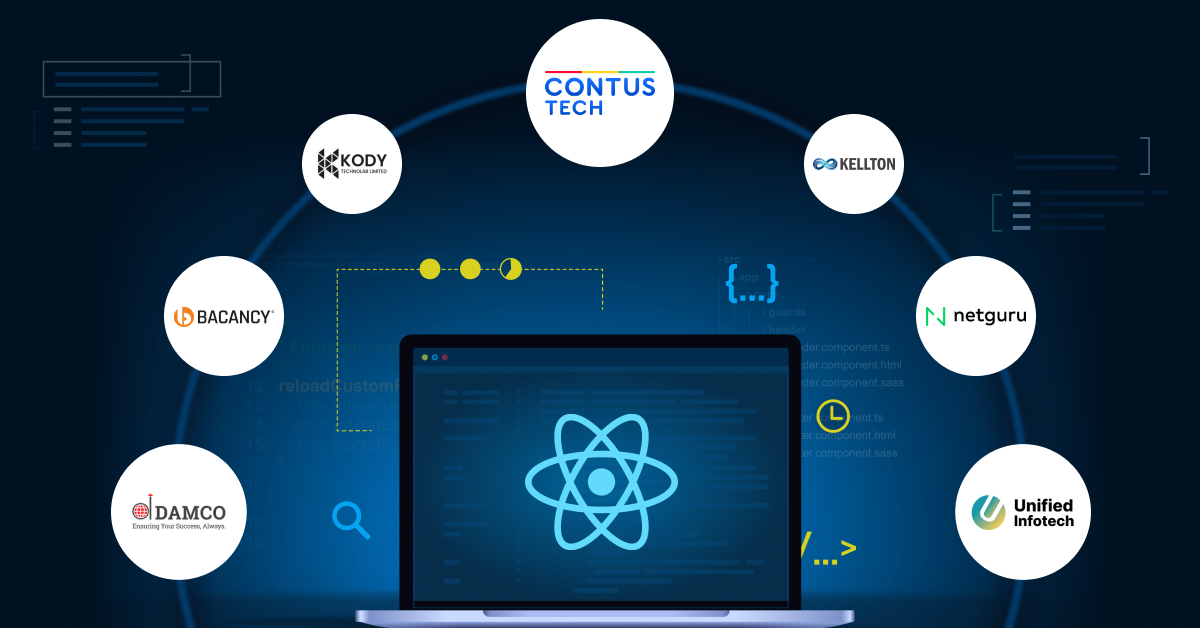How to Hire a Node.js Developer? Save 40% Costs with Top Talent

Before Node.js, JavaScript applications could only be executed on a web browser. This runtime environment promotes server-side development, allowing JavaScript applications to be run outside the browser.
The single-threaded runtime environment seems to be adopted at a rapid rate, with reports saying that approximately 30 million websites use Node.js. Popular brands, like Netflix, Trello, PayPal, LinkedIn, and Walmart, use Node.js for its scalability and request-handling capabilities.
As advantageous as Node.js is, it is vital to find the right talent to build the apps that support it. And that is a difficult task, considering the number of Node.js developers in the market.
This article aims to solve this issue. It talks about the roles and responsibilities of a Node.js developer, the services you can expect from one, the steps to hire a Node.js developer, and plenty more. Keep reading.
Table of Contents
What Does a Node.js Developer Do?
A Node.js developer uses the Node.js runtime environment to create server-side applications and APIs (like RESTful or GraphQL). They prioritize backend logic, ensuring smooth data transfer between the server and the client.
The Node.js developer also focuses on optimizing application performance and ensuring that the developed application has robust security measures.
What Services Can You Expect When You Hire a Node.js Developer?
When you hire a Node.js developer, the services you can expect from them will be based on server-side application building and maintenance. These actions include creating Node.js apps, real-time application development, building and implementing Node.js microservices architecture, migrating to Node.js services, Node.js serverless application development, and integrating Node.js services into existing systems.
| Services Offered | Explanation |
|---|---|
| Custom Node.js App Development | Developing Node.js apps that are personalized to the business’ and industry’s unique requirements. These services usually involve collaboration with other teams (testing and research). |
| Real-Time Application Development | Engineering Node.js apps to record, analyze, and display data in real-time. Live chat and support, dashboards, and gaming platforms are good examples. |
| Node.js Microservices Architecture | Breaking down complex systems into small modular microservices that are programmed to perform specific tasks. Node.js specialists ensure efficient request handling and super-fast response times. |
| Node.js Migration Service | Experienced Node.js developers play a crucial role in assisting businesses move their existing systems to Node.js. The result is an updated app that is faster, scalable, and more reliable. |
| Node.js Serverless Apps | Embracing the power of cloud platforms, like AWS Lambda, Microsoft Azure, or Google Cloud Functions, Node.js experts develop serverless apps with automatic resource scaling capabilities and enhanced security features. Serverless apps are cost-effective and have faster development cycles. |
| Node.js Integration Solution | Integrating Node.js apps with other services, systems, and technologies to create a cohesive software ecosystem that enables better data handling and enhances overall functionality. |
What to Look for When You Hire Dedicated Node.js Developers?
When hiring dedicated Node.js developers, you should consider a combination of technical and soft skills. Technical skills like Node.js and JavaScript are non-negligible, while essential soft skills like strong communication and collaboration capabilities help in smoother project progression.
Additionally, there are other skills a Node.js developer should possess. They are listed in the table below.What to Look for When You Hire Dedicated Node.js Developers?
| Technical Skills | Soft Skills |
|---|---|
| Understanding of JavaScript and ECMAScript Standards | Strong communication skills |
| Proficiency in Node.js and relevant frameworks | Collaboration and teamwork capabilities |
| Expertise in frontend technologies (HTML, CSS) | Analytical and problem-solving skills |
| Knowledge of database technologies like SQL and NoSQL | Being open to feedback |
| Experience in RESTful and GraphQL | Self-motivation to deal with challenges proactively |
| Knowledge of security practices and vulnerabilities | Ability to work in a remote or team setting |
| Expertise in performance optimization operations like memory profiling | Time management skills |
| Skilled in testing methodologies and tools like Mocha, Jest, and Chai. | Strong work ethic |
How to Hire a Node.js Developer? A Step-by-Step Process
To hire a Node.js developer, you must clearly define the scope of the project, pick a hiring model, carefully assess candidates, and finally, onboard the selected candidates. Each step has its own challenges and points to be considered, which are discussed in the sections below.
1️⃣ Define Your Needs and Project Scope
Founders looking to hire Node.js programmers should have a clear understanding of the scope of the project. This includes finalizing the project’s objectives and the tools and methodologies involved in meeting them. A well-defined project scope sets the path for a smooth development process while also attracting the right talent.
A well-defined project scope also helps in drafting a straightforward job description. A potential Node.js developer will appreciate a clearly written job description that talks about the required skillset and proficiency in tools and methodologies.
2️⃣ Choose a Hiring Model
Founders have three options when it comes to hiring Node developers. Each of these options has its own pros and cons. The cost of working with them, the level of collaboration, and the results also vary among the three. It is recommended to extensively research each of the three options before making a decision.
Here are the three hiring models available for founders looking to hire a Node.js developer.
✅ Hiring a Freelancer
The most affordable of the three options. This approach allows businesses to hire Node.js developers for a specific task within the project or the entire project itself. Opting for freelancers is not recommended for long-term projects or those that require extensive collaboration, as they may juggle multiple projects at the same time.
Issues relating to language, time zones, and culture are also common in this hiring approach.
✅ Hiring an In-house Team
Building an in-house team is the most expensive option here. The cost of recruitment, training, salary, and infrastructure may run into thousands of dollars. Also, the project will be put on hold until the hired Node.js programmers have been fully trained.
However, an in-house team offers the best control, collaboration, and supervision of the project. Time zone, language, and culture issues are nonexistent, as they are usually discussed during the hiring process.
✅ Partnering with Outsourcing Companies
Teaming up with an outsourcing company provides the perfect balance between cost efficiency and performance. An experienced Node.js development company has an extensive talent pool of top developers who have been meticulously chosen based on skill, experience, and location. There are fewer time zone and communication challenges in this hiring approach.
The top Node.js development companies also provide dedicated project managers who regularly update clients on the current status of the Node.js project. An outsourcing company is the recommended option for businesses looking to hire Node.js programmers.
3️⃣ Assess Candidates Effectively
Once you have received a list of potential matches, the next step is to assess them. Candidate assessment is a crucial aspect for businesses looking to hire a Node.js developer. Here are three essential tips to choose the right Node.js developer for your project.
✅ Initial Screening
In addition to reviewing their resumes, you should test the candidate’s approach to handling challenges that arise during development. It also helps to ask about the projects they have worked on, the role they played in their previous team, and their technical proficiency on relevant topics.
✅ Coding Challenges
Coding challenges are a great way to test a Node.js developer’s application of concepts in a real-world environment. It is recommended to assign one or multiple coding challenges to the candidate. These tests can be anything, from refactoring a small codebase to using automated tests to build a simple API. Businesses looking to hire a Node.js developer should never ignore coding challenges.
✅ Portfolio Review
Businesses can use portfolios to learn about the proficiency level of a potential Node.js developer. Ask for the developer’s past work, deployed apps, or the projects they have published in GitHub. Portfolio reviews provide insights into the developer’s ability to create functional apps using Node.js.
✅ Interview Questions
Asking questions related to Node.js and related concepts is a vital step when hiring dedicated Node.js developers. The answers to these questions can reveal plenty about the potential candidate, from their problem-solving abilities and expertise on core concepts of Node.js to their ability to collaborate with other teams.
Here are five interview questions to get started.
- How do you manage asynchronous operations in Node.js?
- Are there any particular tools or frameworks you prefer for testing in Node.js? Why do you choose them?
- How can you improve an existing Node.js app based on an increasing user base?
- How do you choose between SQL and NoSQL for your Node.js project?
- How does event-driven architecture differ from traditional server-side environments?
4️⃣ Onboarding
The candidates who’ve aced the interview are now onboarded onto the project. If you have chosen to partner with an outsourcing company, they will take care of the onboarding process, running background checks and ensuring all documents are in order.
Here are some tips for the onboarding process.
- Clear Communication: Be clear and upfront about the details of the contract. Clearly mention the role they’re hired for, their responsibilities, their remuneration, and other information related to the project and the role.
- Provide Necessary Resources: The onboarding process also includes handing over essential resources to the hired Node.js developer. This involves the knowledge transfer process, sharing login information of tools and portals utilized, and the devices the developer will use throughout the project.
- Foster a Collaborative Environment: Making sure the Node.js developer adapts to the company culture is vital. Daily stand-up meetings that aren’t longer than 15 minutes, providing access to a common wiki or knowledge platform, and encouraging open dialogue are great ways to help the new team member settle in.
What Makes CONTUS Tech The Best Technology Partner for You?
CONTUS Tech has been a trusted technology partner for global brands and enterprises for close to two decades. They have a notable presence in over 40 countries, helping businesses develop scalable applications that meet challenging requirements.
CONTUS Tech has an extensive pool of Node.js developers across the globe who’re ready to take up any complex project. Here is a table that compares the Node.js developers at CONTUS Tech with an in-house team and freelancers.
| Category | CONTUS Tech | In-House Team | Freelancers |
|---|---|---|---|
| Recruitment Process | Presents pre-screened candidates for approval. | Involves advertising, screening, shortlisting, and interviewing candidates. | Involves advertising, screening, shortlisting, and interviewing candidates. |
| Talent Pool | Diverse talent pool that contains talent from different skill and experience levels and time zones. | Limited to the location and the exposure of the hiring team. | Limited to the number of developers on the chosen platform. |
| Time to Hire | 2 – 4 Weeks | 8 – 30 Weeks | 4 – 8 Weeks |
| Risk Management | Extremely Low | High | Extremely High |
| Deep Tech Validation | ✅ | ❌ | ❌ |
| Costs | Flexible and affordable engagement models | Extremely high initial costs for training and infrastructure. Recurring costs in the form of salaries and appraisals | Dependent on the freelancer’s location. |
Hand-picked Candidates | ✅ | ✅ | ❌ |
| Flexibility | Adaptable based on project requirements | Fixed team size. Have to hire new resources based on project requirements. | Have to hire new resources based on project requirements. Quality may vary. |
Conclusion
Node.js is a big step in the right direction. This runtime environment allows JavaScript code to be executed outside the browser. It employs asynchronous programming, allowing it to perform multiple tasks simultaneously.
More businesses are migrating to Node.js, increasing the demand for skilled Node.js developers. However, finding the right developer is easier said than done.
Businesses can either choose to build an in-house team or hire freelancers. A recommended option would be to partner with a Node.js development company. They can help you find Node.js developers who are a perfect match for your requirements.
The steps involved in hiring remote Node.js developers can vary as well. Be sure to do your research before investing time and resources into it.
There are numerous things to keep in mind when hiring dedicated Node.js developers. They must be technically sound and must possess the collaboration and communication skills required to work as a team.
Although challenging, finding the right Node.js developer isn’t an impossible task. With the right developer(s), you can build high-performing apps that are secure and support multiple platforms.
Hire Dedicated Node.js Developers to Power Your Team’s Growth!



